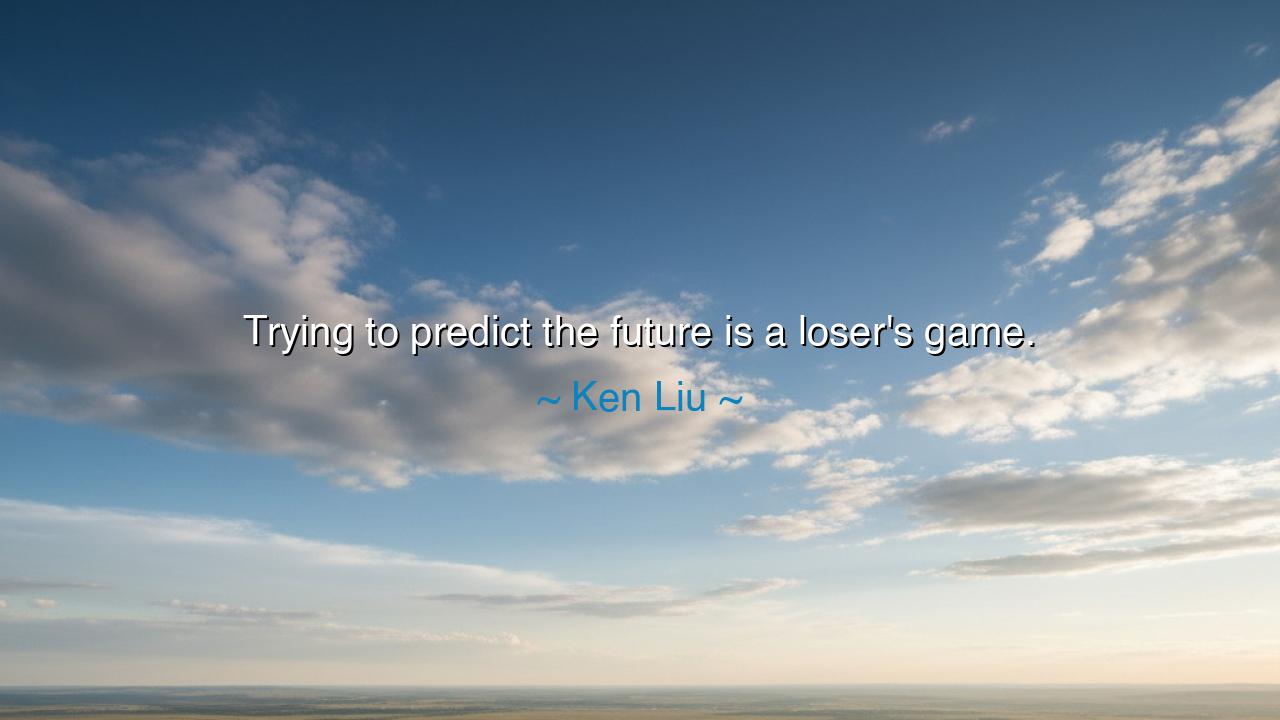
Trying to predict the future is a loser's game.






"Trying to predict the future is a loser's game," says Ken Liu, and in this simple yet profound statement, he imparts a truth as old as human existence. For centuries, mankind has sought to foresee the future, to bend it to their will, and to divine the course of events yet to come. Yet, the wisdom in Liu's words teaches us that this pursuit is often not only futile but also detrimental to our true growth. The future, like a river flowing in its own mysterious way, cannot be captured by the grasp of human hands. It is ever-changing, elusive, and beyond our control.
In the greatest traditions of philosophy and wisdom, the act of foretelling the future is viewed as a dangerous one, for it robs us of the present. Ancient philosophers such as the Stoics and the Buddhists spoke of the importance of living in the moment, for to be consumed by what may come is to neglect the richness of what already is. Epictetus and Marcus Aurelius, the great Stoics, taught that a person must focus on what is within their control: their actions, their character, their reactions. They warned that to worry about a future we cannot shape is to waste the precious time we are given today.
Consider the story of the seers and oracles of old—wise men and women who, under the guise of knowledge, attempted to predict the rise and fall of empires, the fate of kings, and the destiny of nations. While many of these prophecies may have been eerily accurate, they often fell short of the true nature of life: its unpredictability, its resilience, and its ability to surprise. The grand empires of the past, from Rome to the Aztecs, once believed their futures were certain, but none could escape the fickle hands of time. Even the great Alexander the Great, whose ambition sought to conquer the world, did not foresee his untimely death, nor the legacy of his empire’s disintegration.
In our own time, the desire to predict the future remains strong. Scientists, politicians, and business leaders alike employ all manner of tools—calculations, models, and data—to predict the course of the world. Yet, despite all their knowledge, they find themselves baffled by the unforeseen consequences of their actions. The dot-com bubble, the 2008 financial crisis, and the pandemic of recent years all served as reminders that the future is a beast that cannot be tamed by analysis alone. Even the most sophisticated predictions often end in unexpected turns, showing us the folly of placing too much trust in our ability to see the unseen.
This does not mean, however, that we should live without direction or purpose. The lesson Ken Liu offers is not to abandon all plans but rather to embrace uncertainty. It is the acceptance of uncertainty that allows us to act with wisdom. The great warriors and leaders of history did not waste their time with futile predictions but instead adapted to the changing winds of fate. The samurai of Japan, with their codes of honor and discipline, knew that victory was not assured by foresight but by their ability to adjust to whatever challenge arose. They prepared for every eventuality, but they did not attempt to control the unfolding of events with arrogance or hubris.
The true wisdom lies in the realization that life is a journey, not a path dictated by our forecasts. We must learn to live presently, to respond to what is before us with courage and flexibility. The future will come, but it will not do so on our terms. Like a river that flows without stopping, we must learn to navigate its waters with a steady hand and an open heart. What we control is how we react, how we prepare, and how we build resilience.
Thus, the practical wisdom we can take from Ken Liu’s words is this: do not fall prey to the illusion of certainty. Live fully in the present, for it is the only time we truly have. Plan with thoughtfulness, but leave room for the unexpected. Embrace the unknown, for it is not the predictor’s game that leads to fulfillment, but the player’s game, full of adaptability and courage. Remember, the future is not a destiny to be foreseen but a canvas yet to be painted with the brushstrokes of our own actions. Live fully today, and the future will unfold as it will, in its own way, at its own time.






AAdministratorAdministrator
Welcome, honored guests. Please leave a comment, we will respond soon